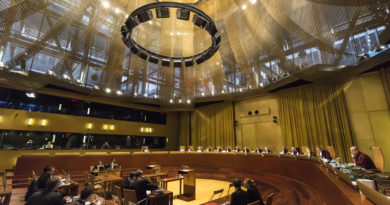EU citizens and residents to be exempted from UK travel ban
The European Commission has called on EU governments to exempt EU citizens, residents and people travelling for essential reasons from the current travel ban imposed on the UK, and from restrictions that will apply from January 1 2021.
Restrictions should be lifted for these groups, as long as travellers test negative for coronavirus in the 72 hours before departure, the Commission said on December 22.
The recommendations were prepared after several EU countries closed their borders to travellers from the UK and representatives of EU member states urgently met to discuss the crisis.
The closure was due to the discovery of a new fast-spreading strain of Covid-19 and the sudden announcement of a lockdown in London and the south east of England.
The Commission tried to ensure a coordinated approach at the EU level. It is however member states that ultimately decide, so it is likely that some measures will continue to differ.
Becoming a ‘third country’
The current crisis has anticipated part of the restrictions planned for the UK from January 1. Until the end of December, EU’s free movement rules apply in the UK and “this means that [EU] member states should not in principle refuse the entry of persons travelling from the UK,” the Commission said.
After the end of the Brexit transition period, however, the UK will be subject to the EU Council recommendation on the restriction on non-essential travel into the EU. Since the beginning of the pandemic, only a small number of non-EU or EEA countries have been on the list of those approved for travel. The list is regularly reviewed and the recommendation is not legally binding, so authorities can also decide to maintain bans in place.
Given the current situation, the Commission has recommended the Council to discourage “all non-essential travel to and from the UK… until further notice”.
However, “any prohibition of transport services, such as flight or train bans, should be discontinued,” the Commission added.
EU and UK citizens travelling to their own country or to the country of residence, as well as third-country nationals that enjoy free movement rights, should be exempted from restrictions, provided that they undergo a test in the 72 hours before departure or quarantine upon arrival, the Commission advised.
Travellers with an essential function, such as medical staff, should be required to take a test (RT-PCR test or rapid antigen test), but not be quarantined while exercising their functions.
Transport staff should also be exempted from travel bans and from tests and quarantines. If a member state requires tests for transport workers, “this should not lead to transport disruptions,” the Commission continued.
Transits, especially for essential travel, should be facilitated without quarantine, although tests can be required.
Commissioner for Justice Didier Reynders said: “Given the current uncertainties and in light of the precautionary principle, member states should take coordinated action to discourage non-essential travel between the UK and the EU. At the same time, blanket travel bans should not prevent thousands of EU and UK citizens from returning to their homes.”
Citizens’ rights group British in Europe commented: “It’s good that the Commission issued this but the bad news is that the Commission is now on holiday until 4 January and member states can ignore the recommendation.” The organisation advised their members to pressure authorities should they face travel restrictions.
Ban, test, quarantine
Meanwhile, EU member states have started to lift the ban imposed on the UK in the wake of the announcement of a new coronavirus strain.
On Sunday 20 December several countries, in the EU and beyond, blocked passengers transport from the UK, and France also halted freight traffic. This has caused queues of thousands of lorries waiting to cross from Dover to Calais.
Thousands of EU citizens have also been stranded in the UK airports just before Christmas.
A Dutch citizen wrote to Europe Street that the situation of EU citizens in the UK had been “difficult enough” since the Brexit referendum, but not being allowed to enter their own country because of a new virus strain was “going too far”.
Italian news outlet La Repubblica reported of a woman arrived in London to pick up their three children, two of them with medical conditions, to spend Christmas together in Italy, but they were left stranded with no medicines at the airport. Others said they were returning home after losing their jobs and they had nowhere to stay while waiting for flights to resume.
Poland took a different approach:
On December 22, France and other countries started to lift part of the restrictions and resume flights for EU citizens and their family members, and people residing in the country. Non-essential travel remains prohibited.
Several EU states require passengers to take a Covid-19 test in the 72 hours before departure and some impose a quarantine upon arrival. Travellers are recommended to check embassies’ website for specific requirements and the dates until measures will remain in place, as they vary for each country.
Claudia Delpero © all rights reserved
Image by pasja1000 from Pixabay
Europe Street News is an online magazine covering citizens’ rights in Europe. We are fully independent and we are committed to providing factual, accurate and reliable information. We believe citizens’ rights are at the core of democracy and information about these topics should be accessible to all. This is why our website and newsletter are available for free. Please consider making a contribution (PayPal link) so we can continue and expand our coverage.





